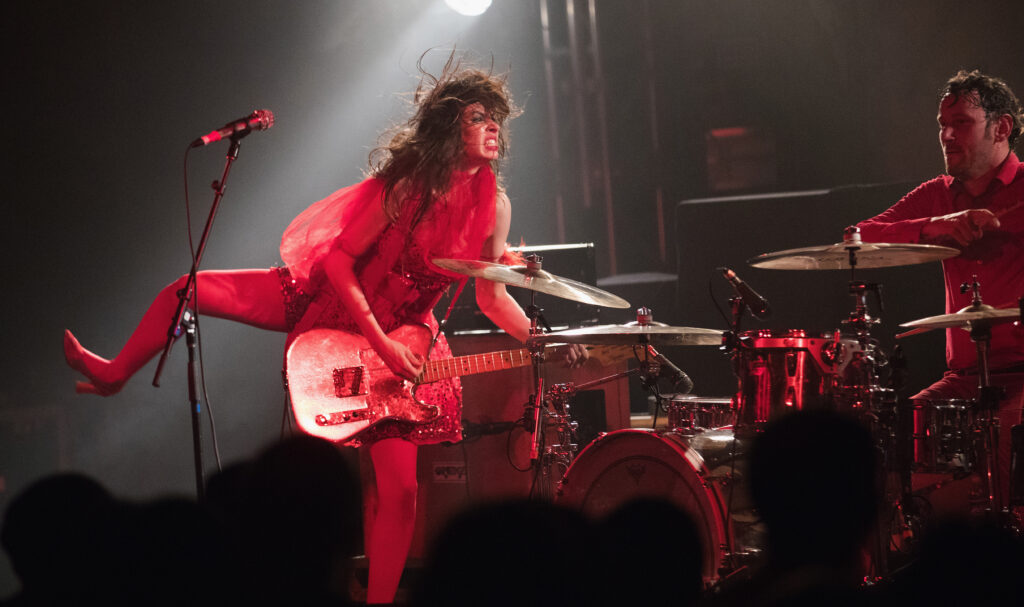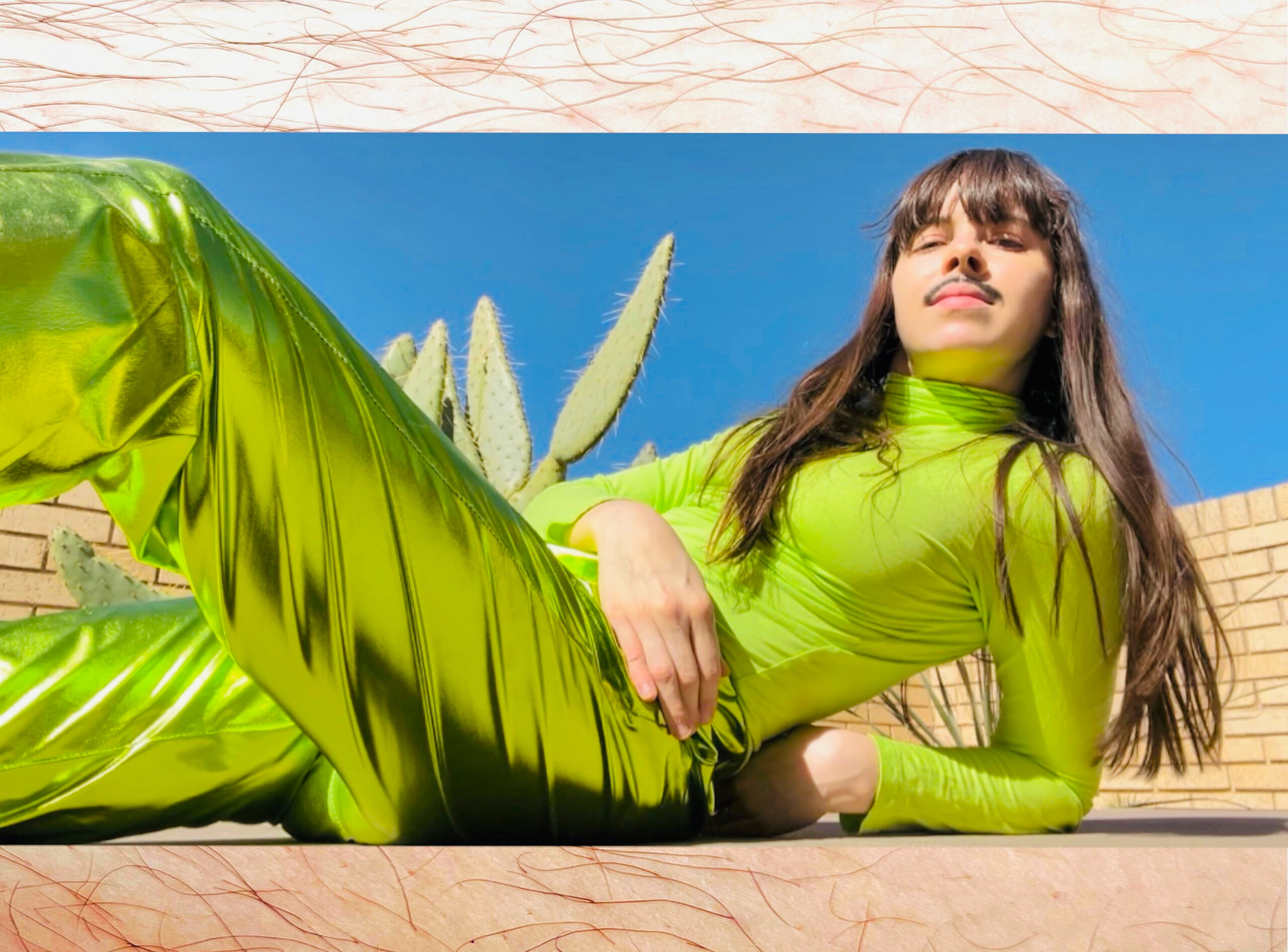Teresa Suárez Cosío is dressed entirely in highlighter green — from her oversized t-shirt to her sneakers — except for the close-up photo of her cat sitting prominently in the center of her chest and her signature drawn-on mustache. It’s an outfit one might expect to find at an EDM festival, but for the artist known as Teri Gender Bender, it’s the kind of everyday attire you wear to the local diner on a Friday afternoon.
Even though there are only a handful of other tables filled at Millie’s Restaurant & Bakery in the San Fernando Valley, nearly every eye in the old-fashioned establishment is on Suárez. Despite her small stature, the singer, guitarist, and keyboardist radiates creative energy that fills the room — all without boasting anything resembling a loud or obnoxious personality.
Every time Suárez speaks, it’s clear that the multitudes within her are constantly interacting with each other — sometimes working harmoniously together, and other times in conflict. On one hand, the bilingual songwriter repeatedly describes herself as “shy” and “socially awkward,” but at the same time, the 34-year-old has an incredible storytelling ability (both through song and conversation) with a charming personality and infectious smile. All these attributes have likely helped make her a popular choice as a vocalist for guitar hero Omar Rodríguez-López (At the Drive-In, the Mars Volta), Melvins, and other musicians.
There’s an entirely different aspect to Suárez whenever she hits the stage as Teri Gender Bender, a powerful alt-rock frontwoman who’s been compared to the likes of a millennial Karen O or Siouxsie Sioux. But while many iconic performers struggle to carry the same weight when moving outside of the genre that built them, Teri Gender Bender has already shown that she’s as versatile as she is talented, whether that’s as the borderline-vampiric face of Mexican punk ensemble Le Butcherettes, with the artsy indie rock act Bosnian Rainbows, or as a solo artist who has released more than a dozen EPs in various styles and genres since last year alone.
“During the pandemic, I organized the hard drives that I’d been storing all of my demos on from the age of 18 to 30,” Suárez says. “A lot of the songs on the new EPs originate from those songs I wrote when I was a teenager, and it was really cool to be able to re-record songs that were super old and forgotten. I loved hearing how innocent and naive I was before. I still am, in some ways, but I hadn’t felt so much toxic energy or situations.”
The latest two EPs from Suárez’s digital vault are Catspeak (which utilizes the cat image from her shirt as the cover image) and next month’s Outsiders, and they continue her evolution beyond the band-driven genres in which she made her name. From bedroom pop to EDM to industrial, the 14 releases dive deep into the songwriter’s complex mind and the uncommon ways she views the trauma and treasures from everyday life. And for those confused about the busy release schedule, Suárez is quick to point out that her frequent collaborator Rodríguez-López has released more than 50 albums either under his own name (some with a trio, quartet, or another famous contributor like John Frusicante or Hans Zimmer) in addition to his work in various bands.

Born in Denver before beginning her musical career as a teenager in Guadalajara, Mexico, after her father died, Suárez started winning artists and fans over in the early 2010s. But the Teri Gender Bender of today is a very different and mature person compared to the one who would thrash around stages covered in red makeup and bloody clothing with Le Butcherettes.
“When I was younger, I was more angsty and would be hurting myself onstage, which was not cool at all,” Suárez says. “My mom would worry about it a lot. Seeing it from afar, I wouldn’t want my daughter doing that to herself. But now, I feel more comfortable with myself and exploring different themes and genres. I don’t have to be so angry all of the time. I don’t have to feel guilty about wanting to make a pop song… or metal… or mariachi. It reminds me that you never have just one emotion. You may feel the same emotion for a long time, but you need to keep pushing forward and paint with all of those emotions that you’re feeling.”
Suárez’s new multi-genre exploration has given her the ability to grow out of her comfort zone and experiment creatively. While she was once happy sticking with the inertia of her bands and not challenging her musical status quo, that version of Teri Gender Bender died in her 20s. The post-pandemic Suárez finds that since she stopped seeking the approval of strangers and checking what people said about her online, she’s become reinvigorated creatively in directions that neither she nor the team she’s built around her had foreseen. Thankfully, the artsy German folks at Clouds Hill seem to be willing to roll with the change in direction so far.
“All of the creative stuff, like the concepts for the new EPs, was the easy part,” Suárez laughs. “The hard part was explaining why I wanted to do it to my bandmates, my family, my team and the label. Luckily enough, everyone was super supportive and motivating. But it was hard even just admitting to myself that I wanted to do these [solo EPs] without feeling guilty for letting down everyone in Le Butcherettes and everyone else after all of the hard work we’ve done.”
Suárez is quick to point out that Le Butcherettes are far from done. Hell, there are even rumblings of a Bosnian Rainbows return, and we can’t even begin to guess what other artist collaborations will emerge for Teri Gender Bender in the coming years. As an artist who’s earned the respect and admiration of industry legends without ever needing a mainstream hit — particularly Rodríguez-López, who’s been a vital influence and mentor — she values everyone she’s worked with and isn’t closing any doors for future collaborators.

“[Working with Rodríguez-López and other famous musicians] has been amazing, because they’re all amazing people — and a lot of them are kind of shy as well,” Suárez says. “Sometimes, no one knows how to break the ice, and someone has to do a little toot or something so we can all break out laughing and get that out of the way. I also love just seeing that they’re all humans with their own insecurities. There’s this ugly voice in my head that says [I’m only successful] because we’re friends and makes me feel guilty, but I’m super grateful for their friendship.”
With every EP release and single that reaches new ears, Teri Gender Bender’s profile grows both within her art-punk/offbeat indie community and outside of it. And with that larger audience has come an increased awareness of how the views of gender identity have changed since Suárez adopted the moniker well over a decade ago. Whether it’s her drawn-on mustache and bikini top, a blood-soaked ‘50s housewife dress and apron. or an oversized men’s blazer, Suárez has never been afraid to challenge gender norms both onstage and in her everyday life. These days, she’s glad to see that one of the causes she’s been firmly entrenched in since childhood is now drastically more prominent on a global scale — even if that’s also brought the bigots on the other side to the forefront as well.
“When I was little, I would pray that people would start thinking outside of the box — especially when it came to gender normality,” Suárez says. “I love that this way of thinking has become more widely recognized and I’m so glad that so many of us were thinking about it that it now became something global. It turns out I wasn’t alone, and whoever else was thinking about it at the time wasn’t alone either. Even going back centuries ago to medieval times, I feel like their suffering wasn’t in vain. But then you also have the other people who are scared by it and that’s slowly building up in the USA and elsewhere right now. It’s a constant battle, but I think we’re going to win.”




